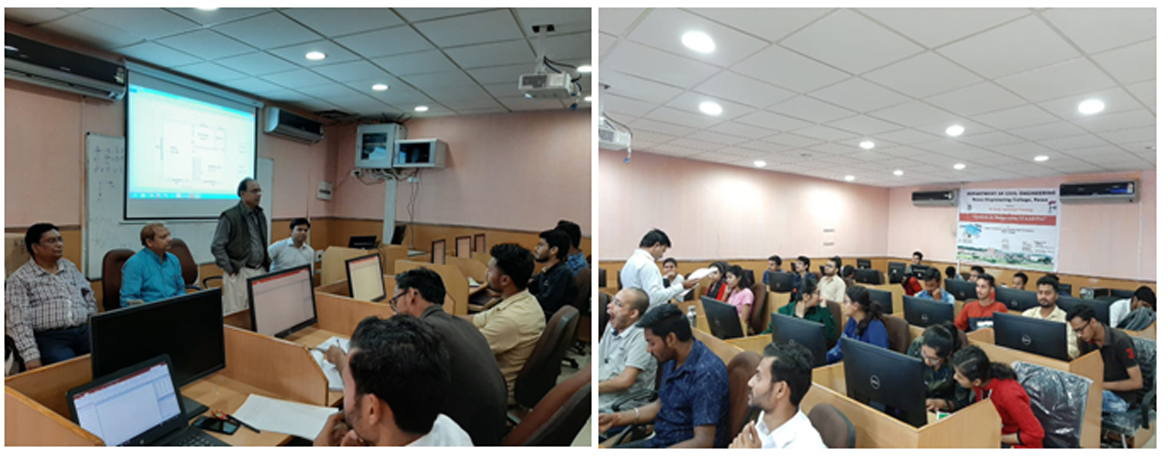Structural Analysis Lab
The structural analysis lab at REC, Rewa has a dedicated space for conducting various experiments as per the curriculum of RGPV, Bhopal.
The structural analysis lab comprises a set of models which are used for establishing the various fundamental principles of structural engineering. These models also helps in understanding the behaviour of various structures under the different loading conditions.
The lab also have non-destructive testing apparatus such as Rebound Hammer and Ultra sonic Pulse Velocity apparatus.
The various experiments which can be performed at structural analysis lab are as follows:
- 1. To verify Maxwell Betti’s law
- 2. To determine the flexural rigidity of a given beam.
- 3. To determine the deflection of a pin jointed truss and to verify the results theoretically and graphically.
- 4. To verify strain in an externally loaded beam with the help of a strain gauge indicator and to verify theoretically.
- 5. To study the behaviour of different types of columns and find Euler’s buckling load for each case.
- 6. To study two hinged arch for the horizontal displacement of the roller end for a given system of loading and to compare the same with those obtained analytically
- 7. To study the behaviour of a portal frame under different end conditions.
- 8. To verify the Muller Breslau theorem by using Begg’s deformator set.
- 9. To study of Rebound Hammer Test
- 10. To study of Ultrasonic Pulse Velocity Test.

Transportation Engineering Lab
The laboratory of transportation engineering in the civil engineering department is well equipped with all the required equipments. Our pedagogy includes every measure that impacts practical knowledge and carries out all the tests required for complete understanding of the subject. Therefore, this laboratory includes various advanced equipments which are helpful in the overall improvement in theoretical as well as practical knowledge of students. This laboratory includes the following major equipments:
| Sr. NO. |
Name of Apparatus |
| 1 |
Impact testing machine |
| 2 |
Los angles abrasion testing machine |
| 3 |
Flash Point Apparatus :Open Cup |
| 4 |
Ring and Ball Apparatus Semi Automatic |
| 5 |
Electric Centrifuge Bitumen Extractor |
| 6 |
Aggregate Specific Gravity Frame and Basket with Weigh Machine |
| 7 |
DLC Vibratory Hammer |
| 8 |
Serological Water Bath |
| 9 |
Digital Modified Marshall Stability Apparatus with CBR |
| 10 |
Digital Ductility Machine |
| 11 |
Hot Air Oven |
| 12 |
Electronic Digital Balance |
| 13 |
Electronic Digital Balance |
| 14 |
Universal Penetrometer |
| 15 |
A set of Coarse Sieves |
| 16 |
A set of Fine Sieves |
| 17 |
Pycnometer Bottle Capacity 900 ml |
| 18 |
Plastic Jar Capacity 1000 ml, 500 ml, 250 ml, 100 ml |
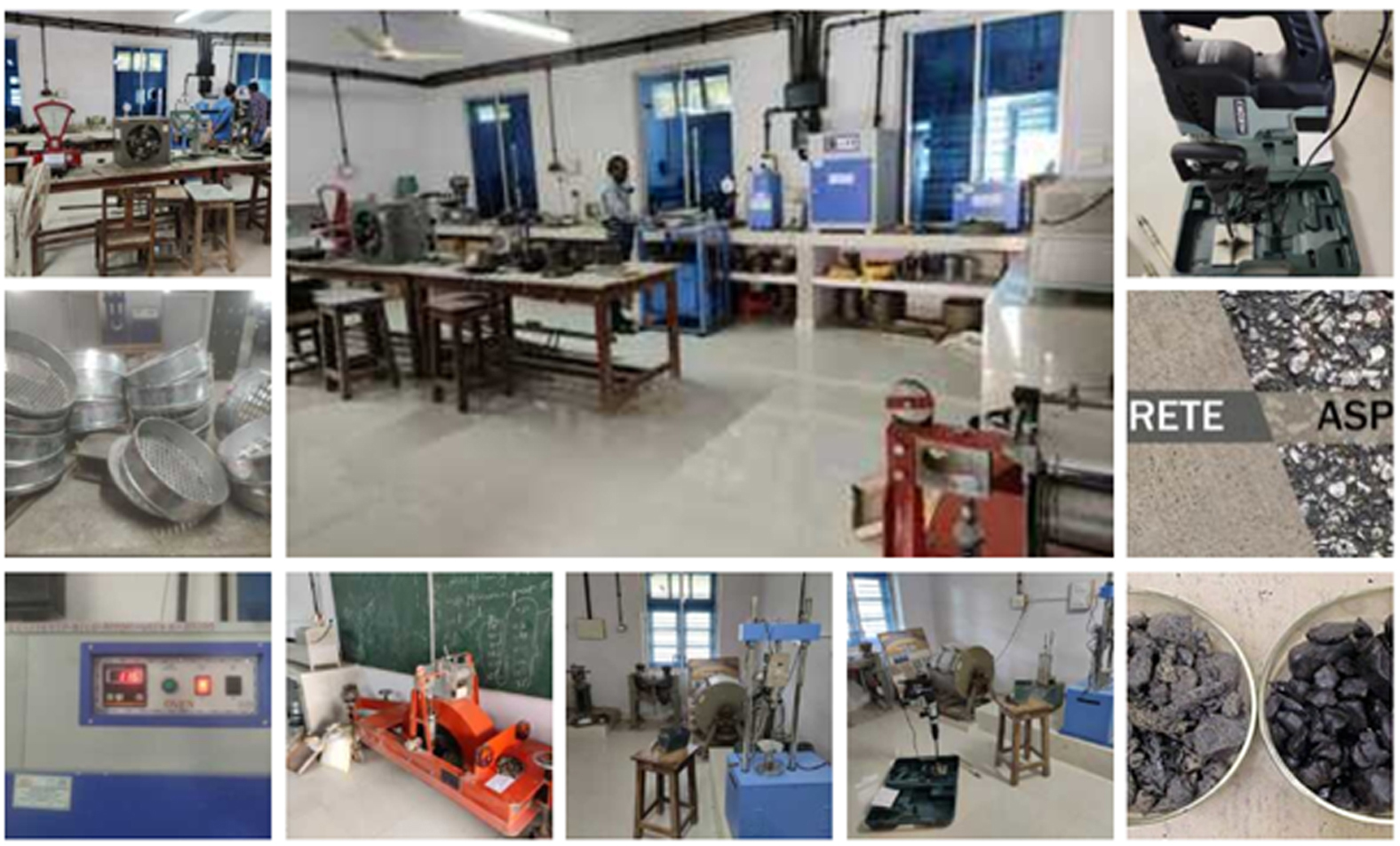
Geotechnical Engineering Lab
Geotechnical engineering is the branch of civil engineering that deals with the engineering behavior of subsurface materials. It includes Soil Mechanics, which is essential to identify, characterize and study the mechanics of soil/rock and Applied Soil Mechanics, which transfers the behavioral knowledge to practice. This includes investigating existing subsurface conditions and materials; determining their engineering behavior that are important to the project considered and designing the foundations.
A typical geotechnical engineering laboratory helps in identifying the engineering behavior of soil. Our Geotechnical Engineering Laboratory is well-equipped with equipments for evaluating all engineering properties of soils including index properties, compaction characteristics, consolidation characteristics and shear strength of soils.
Digital Geotechnical Systems are housed in a separate glass chamber. The triaxial testing machine with CPU is attached with an Electronics Instrumentation system in which the LVDT shows the display of pore pressure, deformations and load. The LVDT readings are interfaced with a Data Logger. This modernization has been extended to consolidation setup also with an introduction of LVDT.
Capabilities
Equipment 1: Soil Moisture Content Testing Apparatus
This equipment allows determination of soil moisture content using tools such as cans, Oven, and Balance.
Equipment 2:: Specific Gravity Determination Apparatus
The equipment is meant to demonstrate the determination of specific gravity of soil and gravel specimens using apparatus: Volumetric Flask, Balance and Oven.
Equipment 3: Standard Sieve sets
The equipment is to support experimental determination of the quantity and percentage of sand, gravel and boulders in a given soil sample by conducting sieve analysis.
Equipment 4: Hydrometer Analysis (Hydrometer, Mixer)
The equipment (Hydrometer and Mixer) allows testing of soil to determining fine grained soils contents such as clay particles in a given soil specimen.
Equipment 5:: Liquid Limit Test Apparatus
This Liquid Limit Test apparatus allows measurement liquid limit of a given soil specimen by conducting test using Casagrande Liquid Limit Device, and Tools.
Equipment 6: Plastic Limit Test Apparatus
This test apparatus allows measurement of plastic limit of a given soil specimen by conducting test using Glass Plate, Cans, Spatula and Oven.
Equipment 7: Modified Proctor’s Compaction Test Equipment
This test equipment allows measurement optimum moisture content (OMC) of soil specimens.
Equipment 8: Sand Cone method Tools, Ottawa sand, Balance
This equipment allows measurement of “Field Unit Weight” compacted soil mass and its moisture content.
Equipment 9: Unconfined Compression Test Machine
This equipment allows determination of unconfined compression strength of soil and its shear strength.
Equipment 10: Direct Shear Test Machine
This equipment allows measurement of shear strength of sand and determination of angle of friction.
Equipment 11: Triaxial Shear Test Machine
This equipment can be used for research and conventional testing for determining shear strength parameters. It has the capability to carry out test on a compacted or on an undisturbed soil samples to conduct tests under different conditions of consolidation (consolidated and unconsolidated soil tests) and different conditions of drainage (drained or undrained conditions). Measurement of shear strength of soil and the stress-strain behavior and failure can be determined.
Equipment 12: : Consolidation Test Machine
This equipment can be used for research and conventional testing to determine soil parameters relating to settlement properties and behavior. It can be used to estimate both the magnitude and the time rate of settlement.
Apart from this lab also have the filed test facilities such as Standard Penetration Test & Plate Load Test. We have been providing consultancies in this region since the inception of Geotechnical Engineering Lab
Lab at a Glance:

Concrete and Material testing laboratory
The Concrete lab at RewaEngineering College, Rewa has a dedicatedspace for conducting various experiments as per the curriculum of RGTU, Bhopal. The lab comprises a set of working equipment and tools which are helpful in understanding the construction materials behaviors. Some of the sophisticated instruments are also there like digital compress meter, extensometer and rebar locator etc.
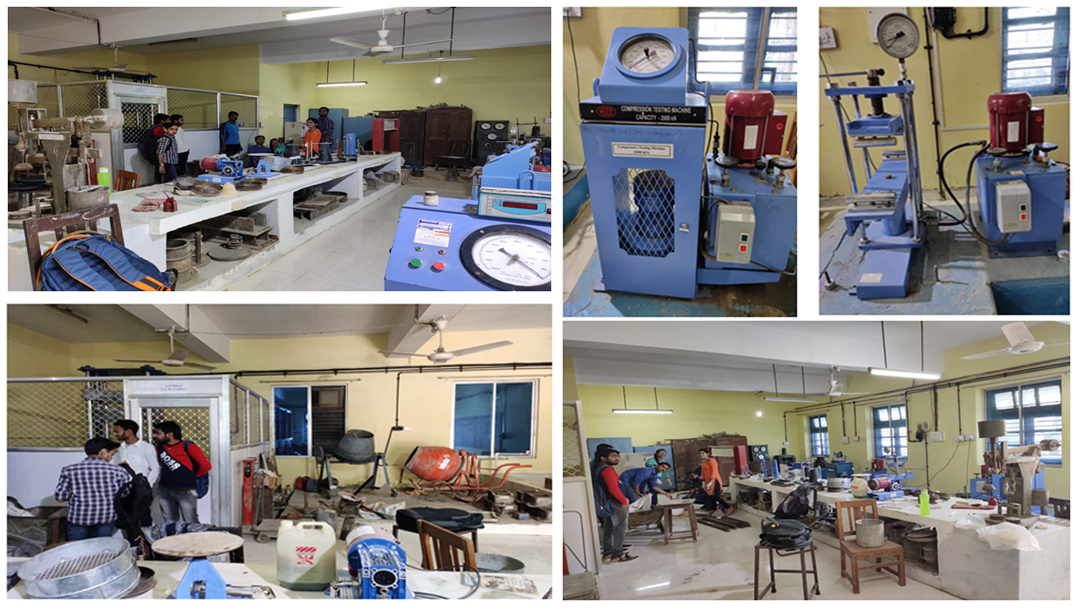
Hydraulics lab
The Hydraulics lab at RewaEngineering College,Rewa has a dedicated space for conducting various experiments as per the curriculum of RGPV, Bhopal.The Hydraulics lab comprises a set of working models which are helpful in understanding fluid flow behaviour and its computation for various set of discharges. It also consists of a long recirculating flume to study open channel characteristics like channel transition and hydraulic jump phenomenon of flow. Apart from it there are model of turbines and pump to study its performance.The various experiments which can be performed at structural analysis lab are as follows:
- 1. Determination of Friction Factor of a pipe
- 2. Determination of metacentric heightof a ship model
- 3. Determination of Cc, Cv and Cd of Orifices
- 4. Calibration of Orifice Meter
- 5. Calibration of Nozzle meter and Mouth Piece
- 6. Reynolds experiment for demonstration of stream lines & turbulent flow
- 7. To study the characteristics of a centrifugal pump
- 8. Verification of Impulse momentum principle
- 9. To study the characteristics of a reciprocating pump
- 10. To study the characteristics of a Pelton wheel turbine
- 11. To study the characteristics of a Francis turbine
- 12. Calibration of Venturimeter
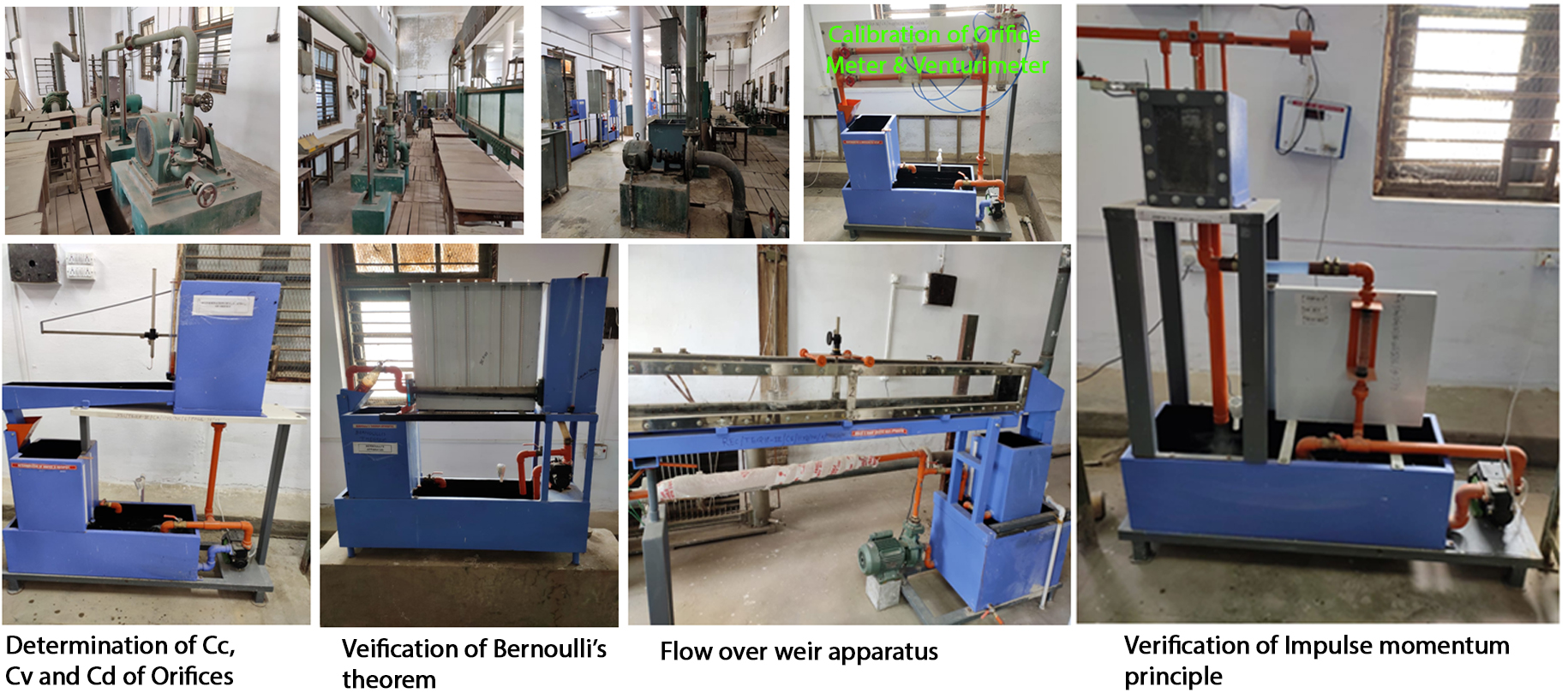
Surveying & Remote Sensing Laboratory
Surveying takes the leading place in planning, designing and execution of any kind of construction work. Moreover, knowledge in surveying plays a vital role in the professional practice of civil engineers and architects. Hence, Surveying Laboratory provides students with hands-on experience to supplement instruction in surveying courses. The Surveying Lab consists of an variety of high-tech equipment for performing various engineering measurements, such as, Total stations, Digital Theodolite, Automatic digital levels, Transit Theodolite, Dumpy Level, Auto Level and Prismatic, Surveyor compass for basic instructional and research purposes. Students use the laboratory as an integral part of their surveying coursework and obtain any topographic information that can help their capstone design projects, such as Building planning, highway design and any kind of land development aspect.
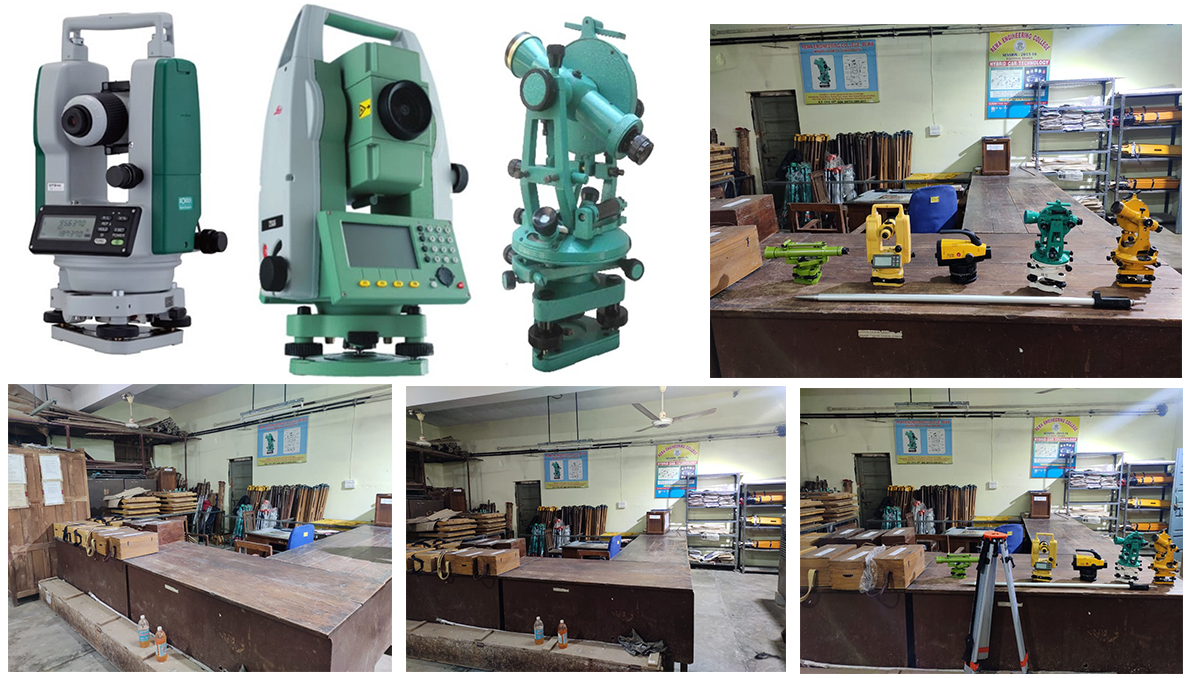
Engineering Geology Laboratory
Laboratory in charge:
Faculty:
- 1. Dr. D.K Singh
- 2. Mr .Bicky Agarwal
Technical Staff:
- 1. Shri Ramyash Patel
- 2. Shri Ramswaroop Kol
The identification of different types of rocks and minerals with the help of their physical properties is the main objective of Engineering Geology Laboratory. Determination of dip and strike, determination of dip by graphical method, construction of geological cross-sections across a geological map are done in this laboratory. This laboratory consists of the following experiments
List of Experiment's (Expandable)
- 1. Identification of simple rock forming minerals and important ores.
- 2. Identification of rocks
- 3.Simple map Exercises
- 4. Field Visit/Geological Excursion
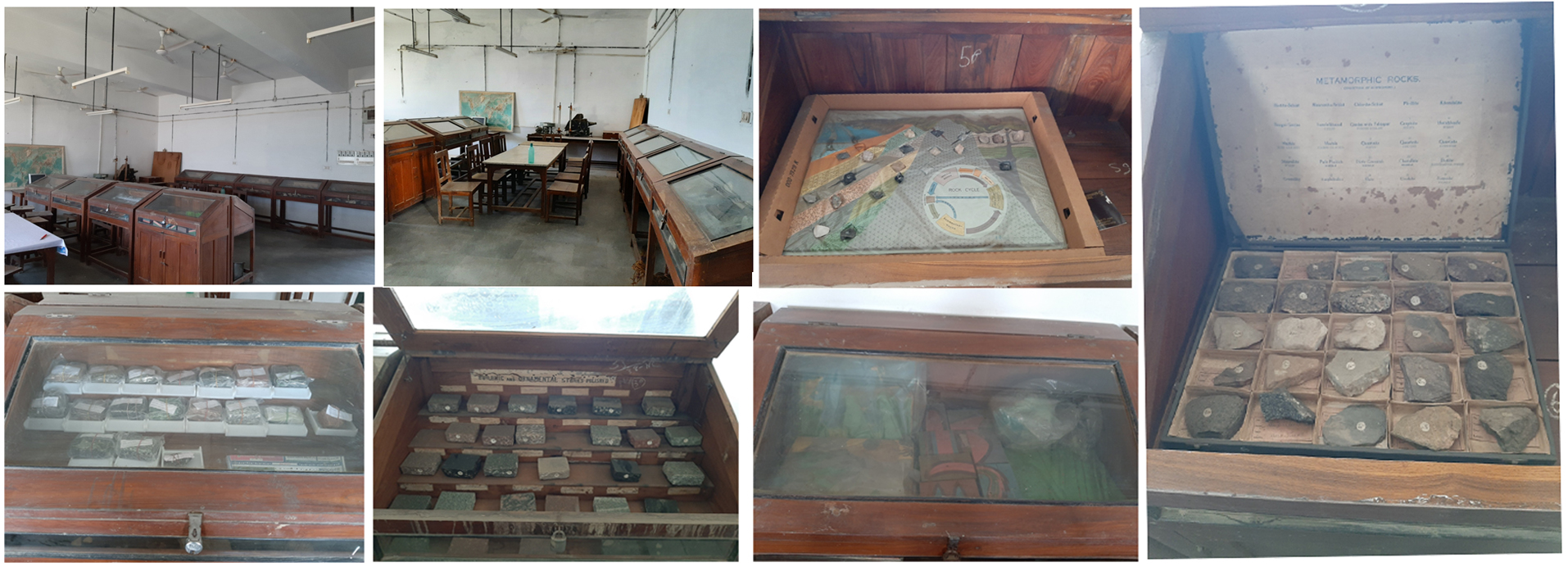
Environmental Engineering Lab:
This lab consists of Water Quality Analyzer(pH, TDS, Conductivity, D.O., ), Nephlometer for measurement of turbidity, Digital weighing machine, BOD Incubator, JAR Test Apparatus, Digital Muffle furnace, Hot Air Oven etc. Lab also facilitates titration apparatus for various tests of water quality such as Hardness, alkalinity etc. Apart from this, efforts are being made to cope up with the future advancements.

Computer Laboratory (Design Center)
The Computer Laboratory (Design Center)at REC, Rewa has a dedicated space for conducting various experiments as per the curriculum of RGPV, Bhopal, which is used by Civil Enfineerig Department as per the requirement.
The Computer Laboratory (Design Center)has following instruments and softwares:
- 1. 30 Computers with Server.
- 2. Bundled license of Bentley-CATIA and STAAD-Pro.
- 3. Projector and Screen.
Following programs has been organized:
- 1. 90 hours training program on AutoCAD (from 01/06/2019 to 12/06/2019) by CRISP Bhopal at REC Rewa.
- 2. Workshop on STAAD Pro by experts from MNNIT Allahabad (from 28/09/2019 to 02/10/2019) at REC Rewa.
- 3. 10 days training program on AutoCAD (from 13/03/2020 to 22/03/2020) by CRISP Bhopal at REC Rewa.
- 4. 10 days training program on STAAD-Pro by CRISP Bhopal at REC Rewa.
